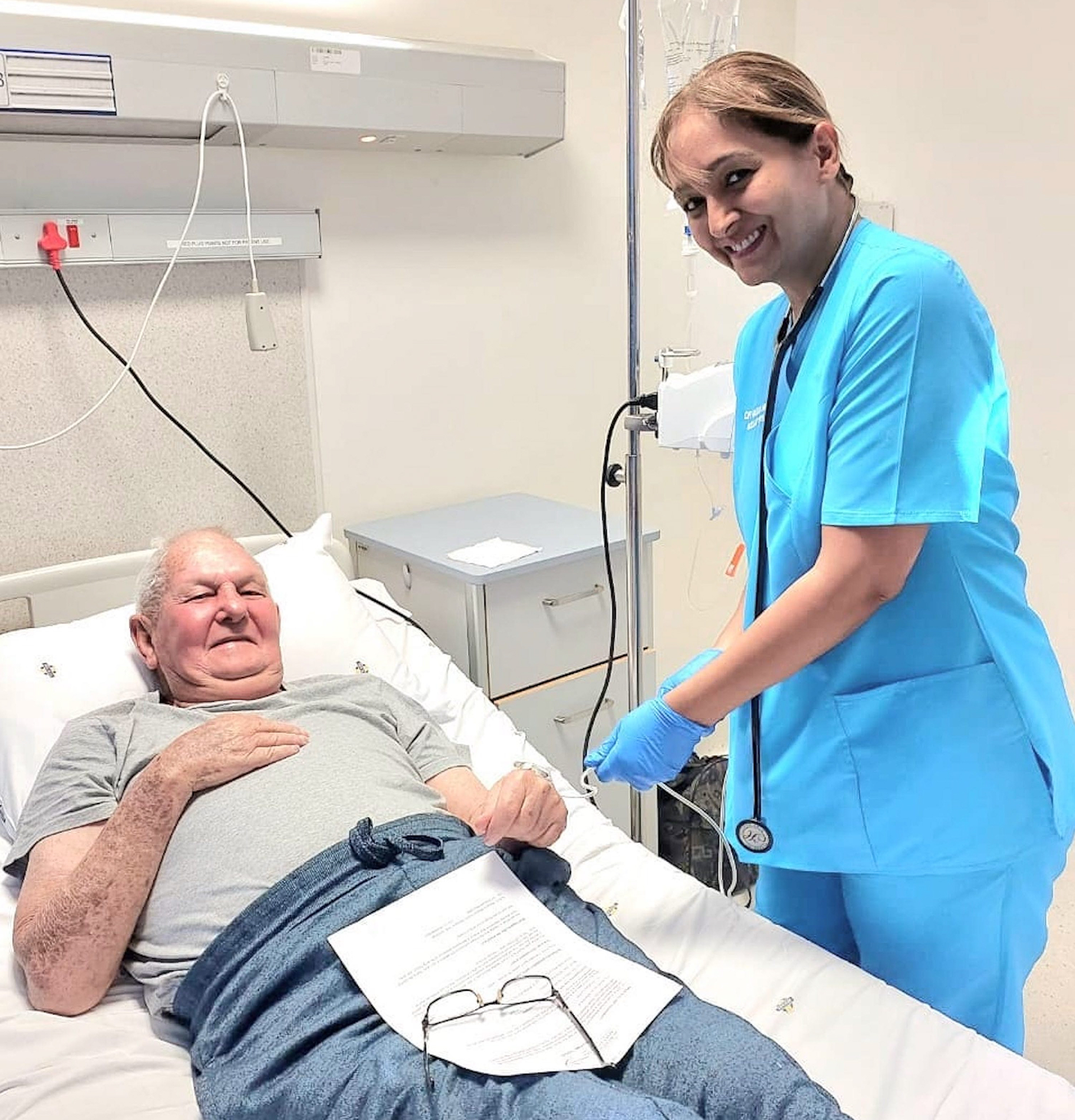New frontiers reached in the treatment of advanced prostate cancer
The first two private sector patients with advanced prostate cancer were treated with 225-Actinium-Prostate Specific Membrane Antigen (Ac-225-PSMA) by specialist nuclear physician and Head of the Nuclear Medicine Department at Netcare uMhlanga Hospital, Dr Masha Maharaj, and her team earlier this month. Pictured here is 75-year-old Mr Graham Tayler with Dr Masha Maharaj.
New prostate cancer treatment sparks optimism for private sector patients
A treatment for the management of advanced prostate cancer, recently introduced in the private healthcare sector, is sparking a fresh wave of optimism for patients throughout Africa.
The first two private sector patients with advanced prostate cancer were treated with 225-Actinium-Prostate Specific Membrane Antigen (Ac-225-PSMA) at Netcare uMhlanga Hospital by specialist nuclear physician and Head of the Nuclear Medicine Department at uMhlanga Molecular Imaging and Therapy, Dr Masha Maharaj, and her team earlier this month.
Commenting on the breakthrough treatment, Dr Maharaj said, “Actinium-225 is a radioactive substance that we can add to a carrier called prostate-specific membrane antigen (PSMA). It is an atom that sends out radioactive particles, and PSMA joins the patient's tumour with the radioactive Actinium atom attached to it.
“The treatment is injected into the vein and once inside the body, it seeks out prostate cancer cells attaching firmly to them to deliver a precise, potent dose of radiation to destroy the cancerous cells. Known to be highly effective in the treatment of prostate cancer, any Ac-225 PSMA that is not absorbed by the tumour cells passes out of your body in your sweat, saliva, urine and stool. An average of four to six Ac-225-PSMA treatments are generally required,” explains Dr Maharaj.
Netcare uMhlanga Hospital is the only private healthcare facility in Africa to provide this highly specialised Ac-225-PSMA treatment, which is usually indicated for patients with progressive metastatic castrate-resistant prostate cancer (mCRPC) who have failed current standard lines of therapy, such as radiation, chemotherapy and hormonal therapy.
“There have been excellent outcomes reported with complete response to therapy, and for the majority of patients, there is a significant result in palliation or better pain control, delayed tumour progression (slowed tumour growth) and improvement in quality of life and overall survival. One of the remarkable characteristics of the therapy is its minimal and manageable side effects, setting it apart from various other cancer treatments.
“The patients, 75-year-old Mr Graham Tayler and 82-year-old Mr Allan Smith, presented to us late in the development of their cancers. However, within 24 hours following the procedure, they were both reported to be doing well and pain-free,” notes Dr Maharaj.
She adds that the therapy is poised to make a significant difference in the lives of prostate cancer patients who have shown resistance to alternative treatments. “For these patients, it has the potential to inspire a renewed sense of hope. Furthermore, the implementation of these targeted therapies is expected to yield cost savings within the healthcare sector. Unlike systemic therapies, which often come with a broader range of side effects, targeted therapies offer a more focused and gentler approach,” Dr Maharaj says.
There are strict international security standards regarding radiation safety, and to ensure reproducible results with uniform outcomes, such procedures can only be undertaken in a highly specialised nuclear medicine centre by specialist nuclear physicians with properly trained support staff.
Underlining the significance of specialised expertise and infrastructure in performing such intricate procedures, Dr Maharaj said it was a proud moment for her and her team of eight. “The newly upgraded laboratory at uMhlanga Molecular Imaging and Therapy has been especially equipped for preparing the Acc225-PSMA, which required imported components.”
“As a department we are proud to be part of this milestone in the private sector. The current clinical practice has shifted to precision medicine. These targeted therapies are playing a pivotal role in reducing clinical symptoms and facilitating the destruction of cancerous cells while minimising damage to healthy cells and preserving normal function.
“This therapy has great promise for men with advanced prostate cancer, in South Africa and elsewhere on the continent, improving overall survival and quality of life. We look forward to many more groundbreaking initiatives in medicine for the benefit of our patients,” concludes Dr Maharaj.













